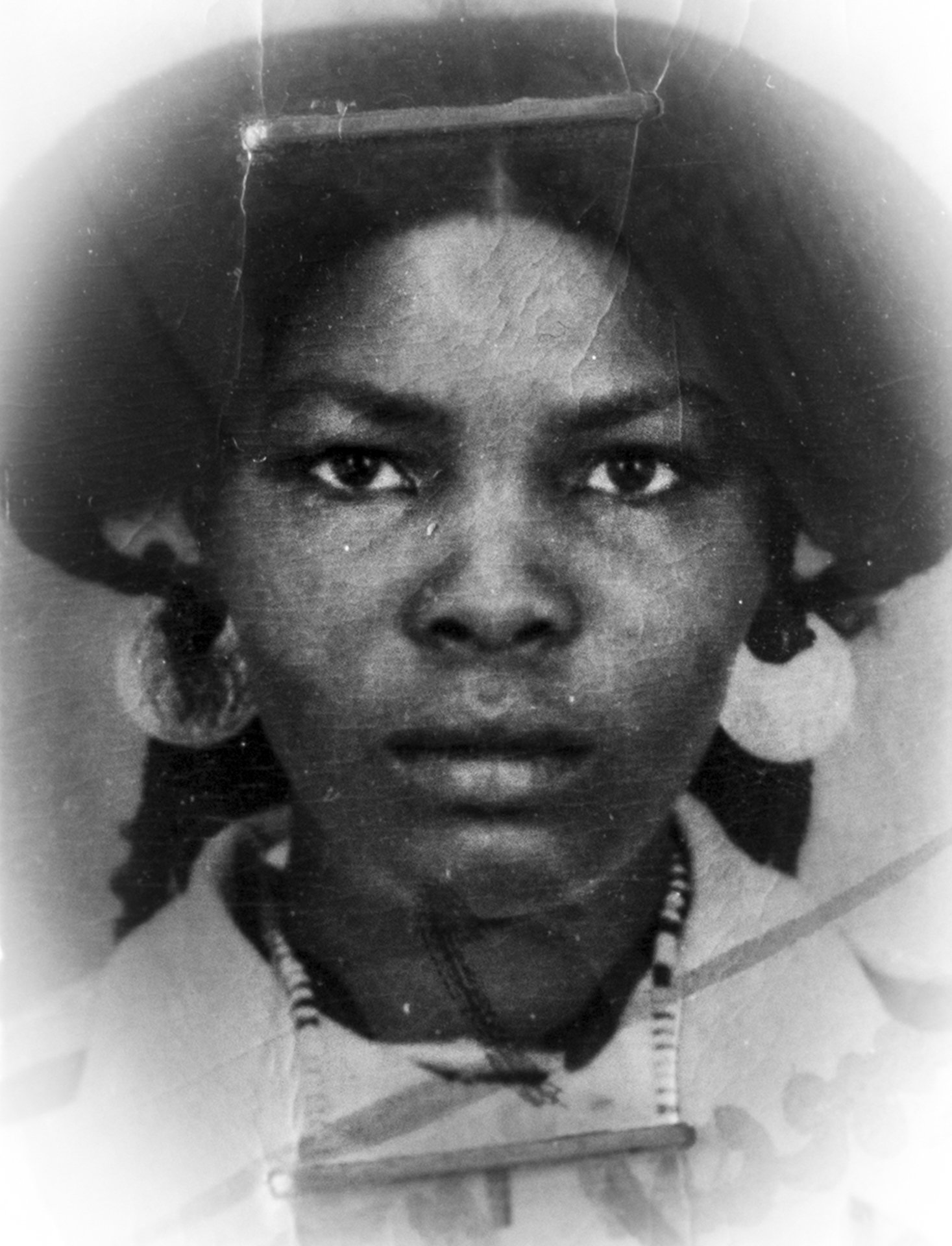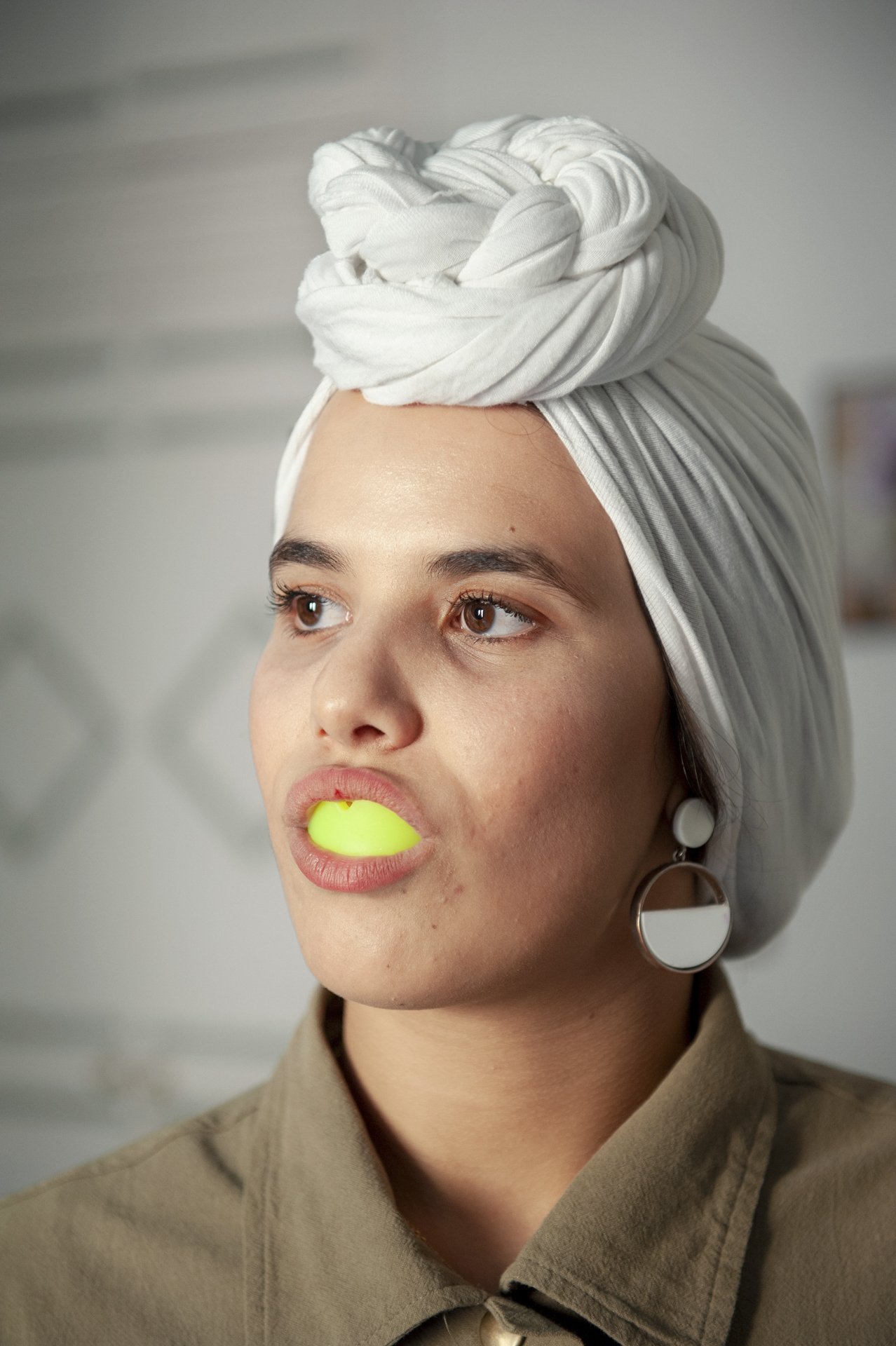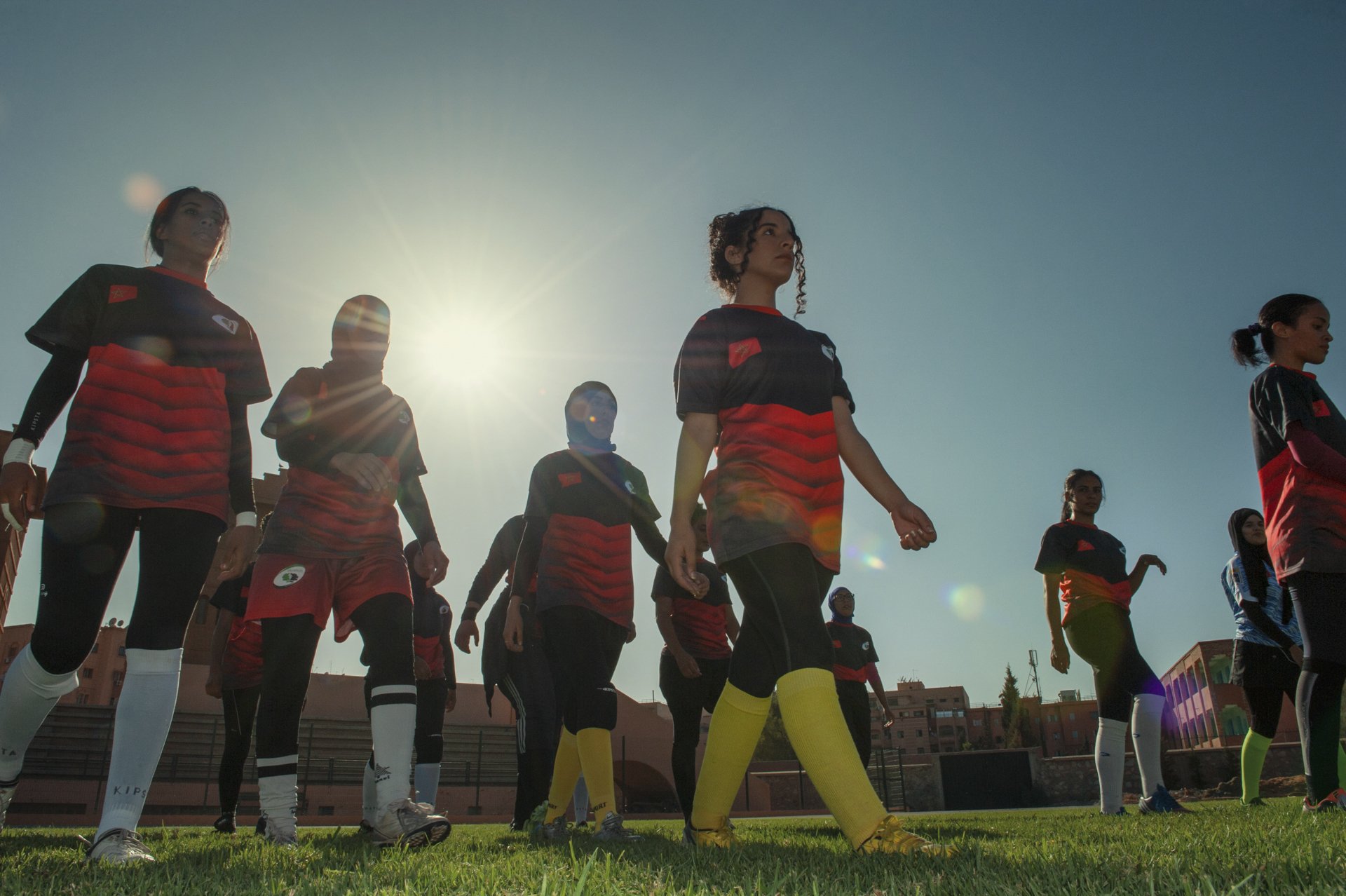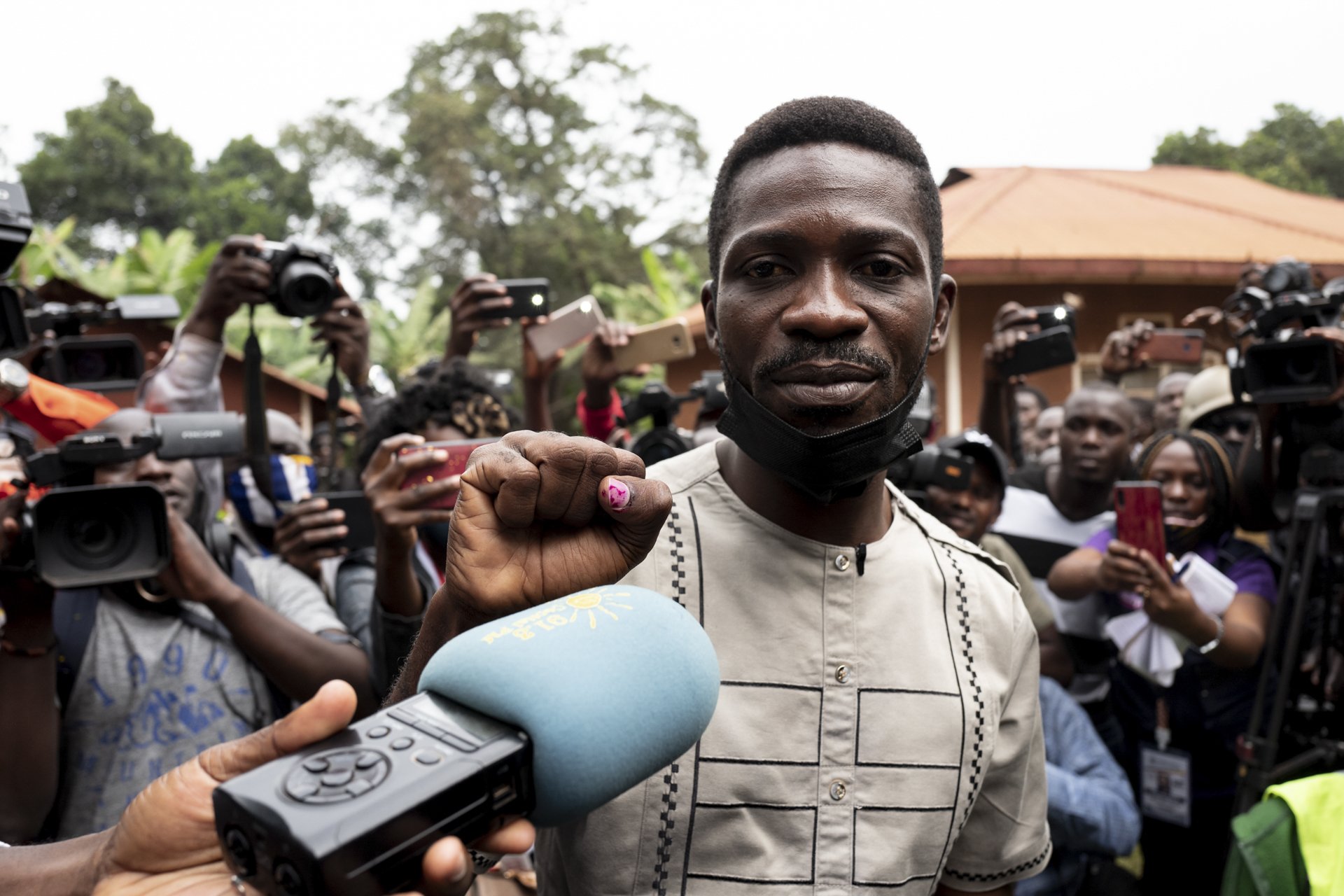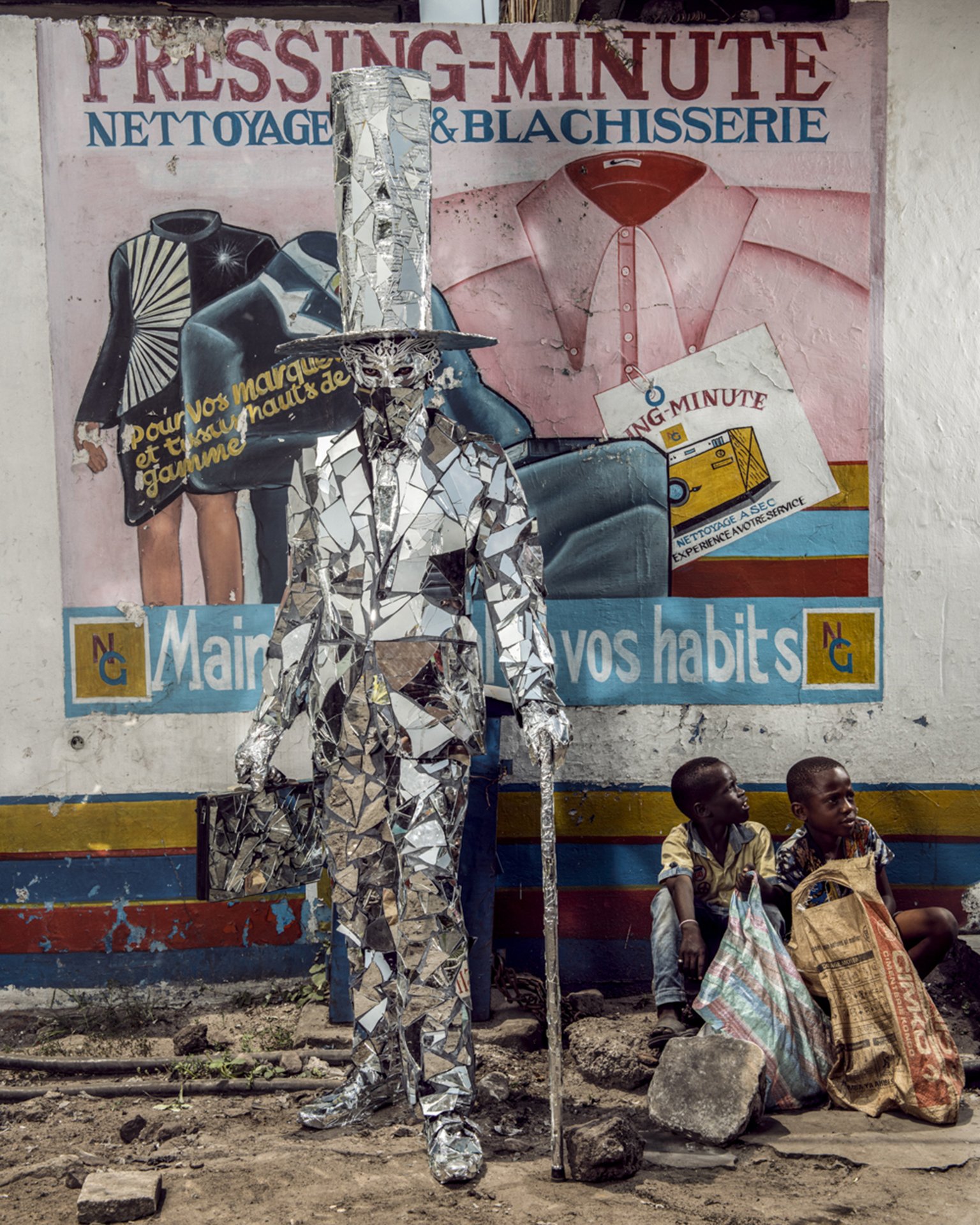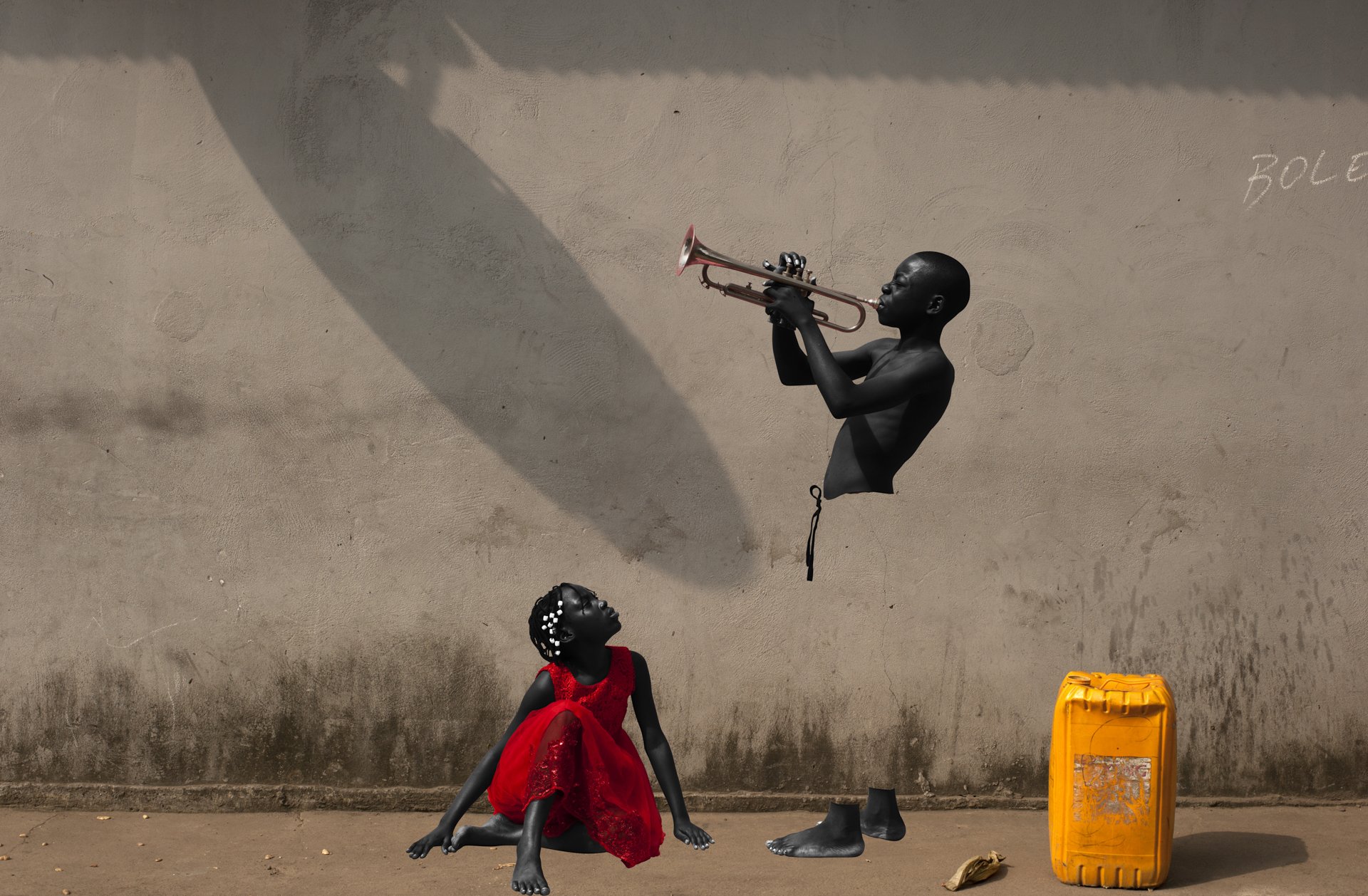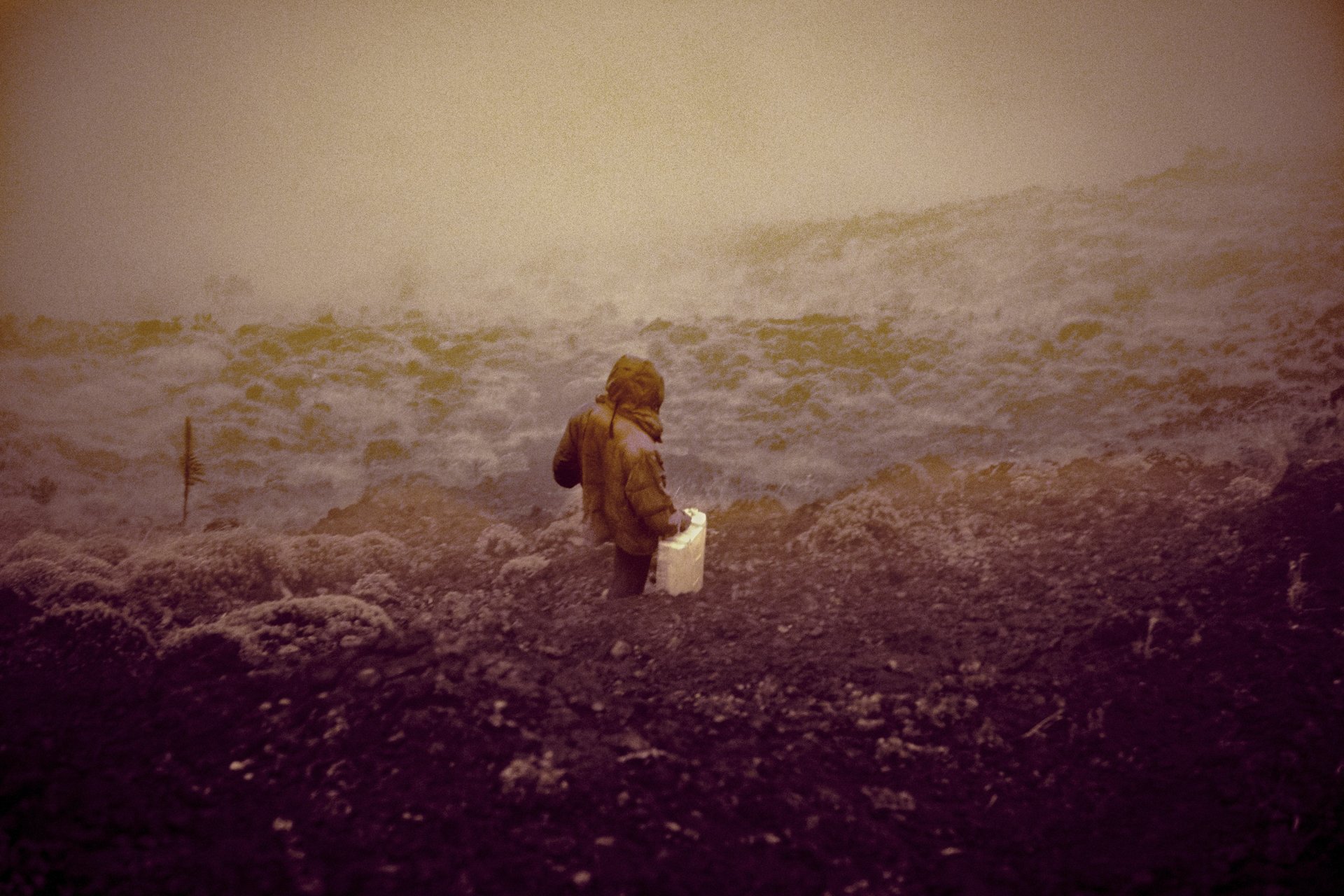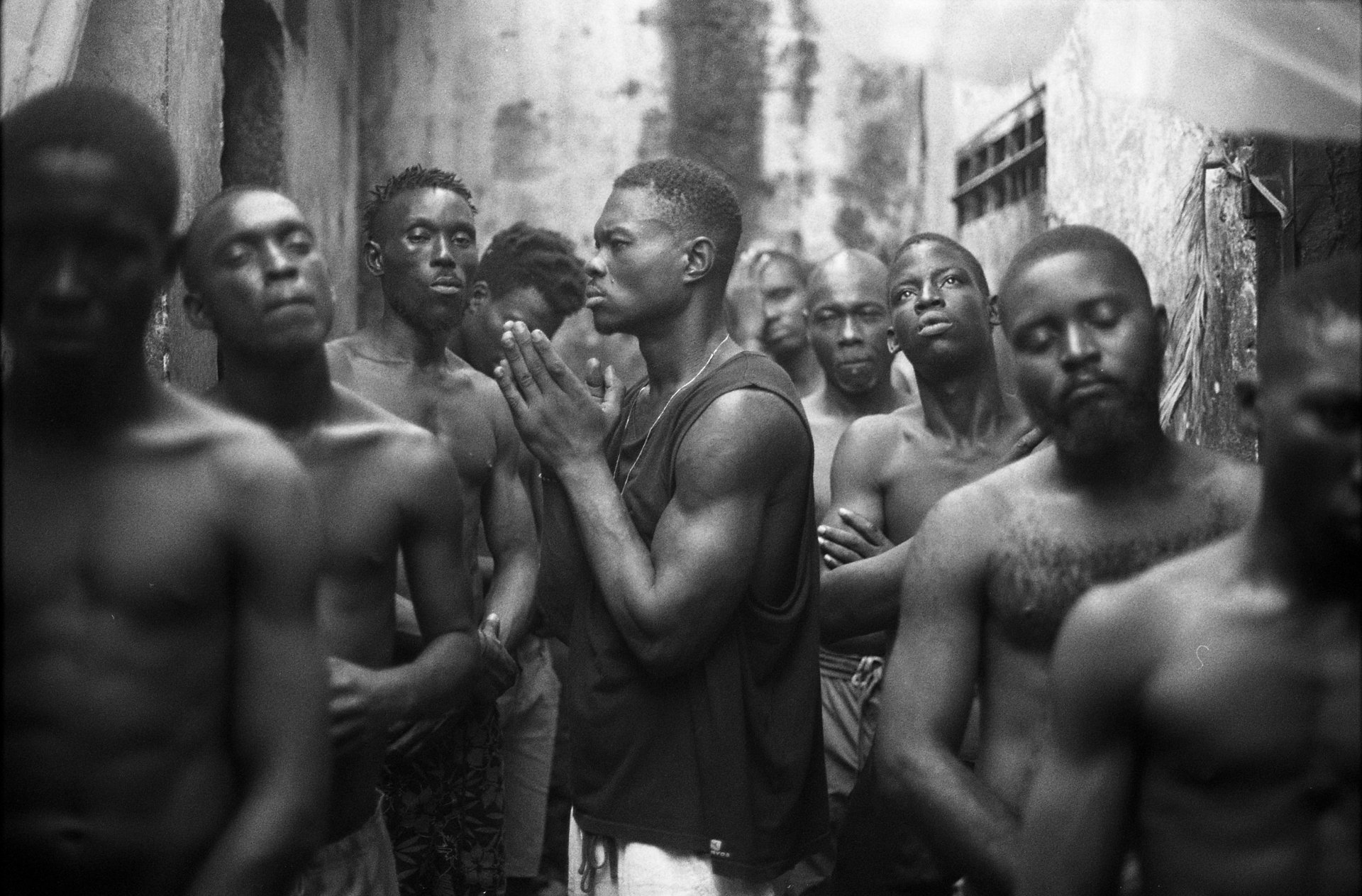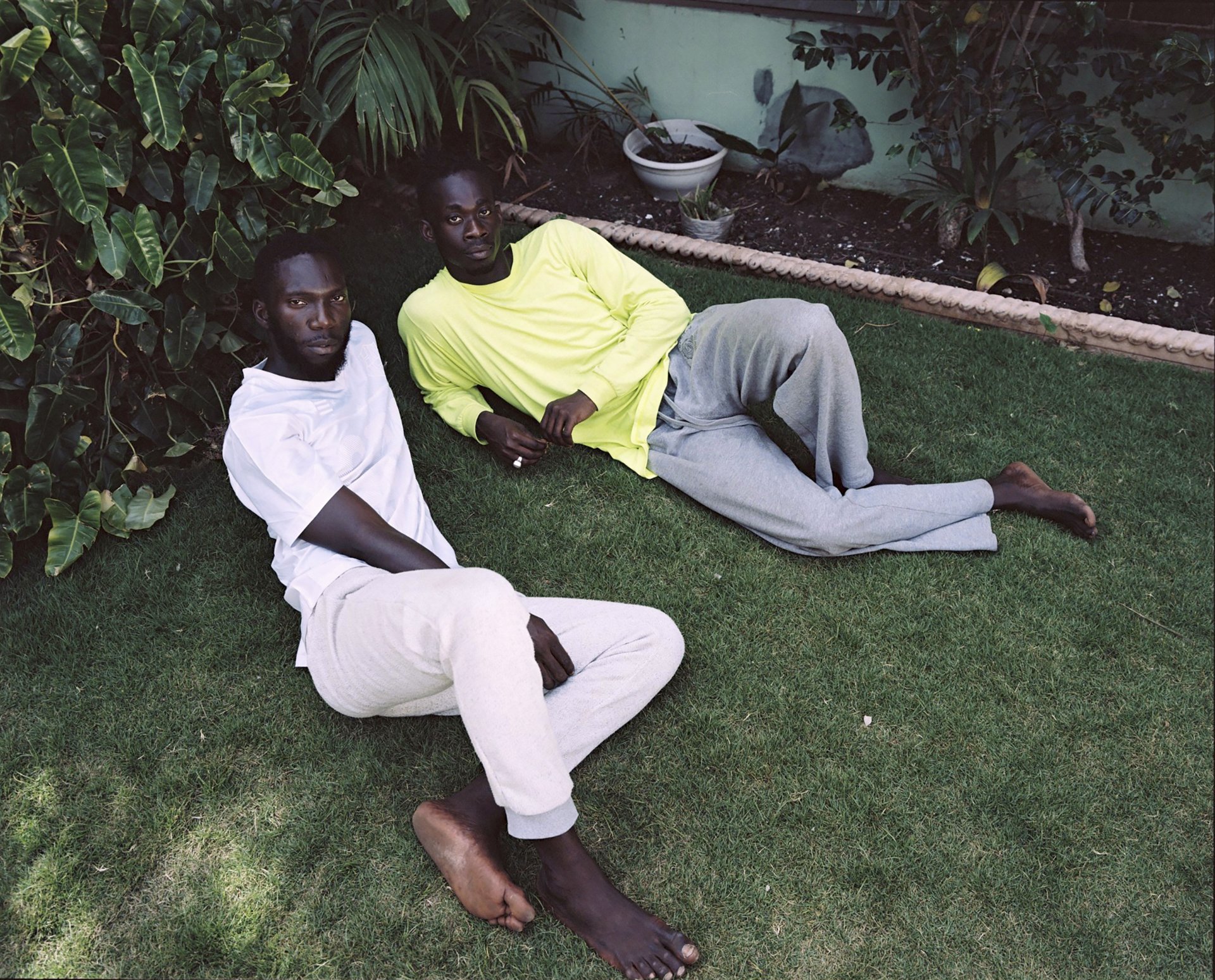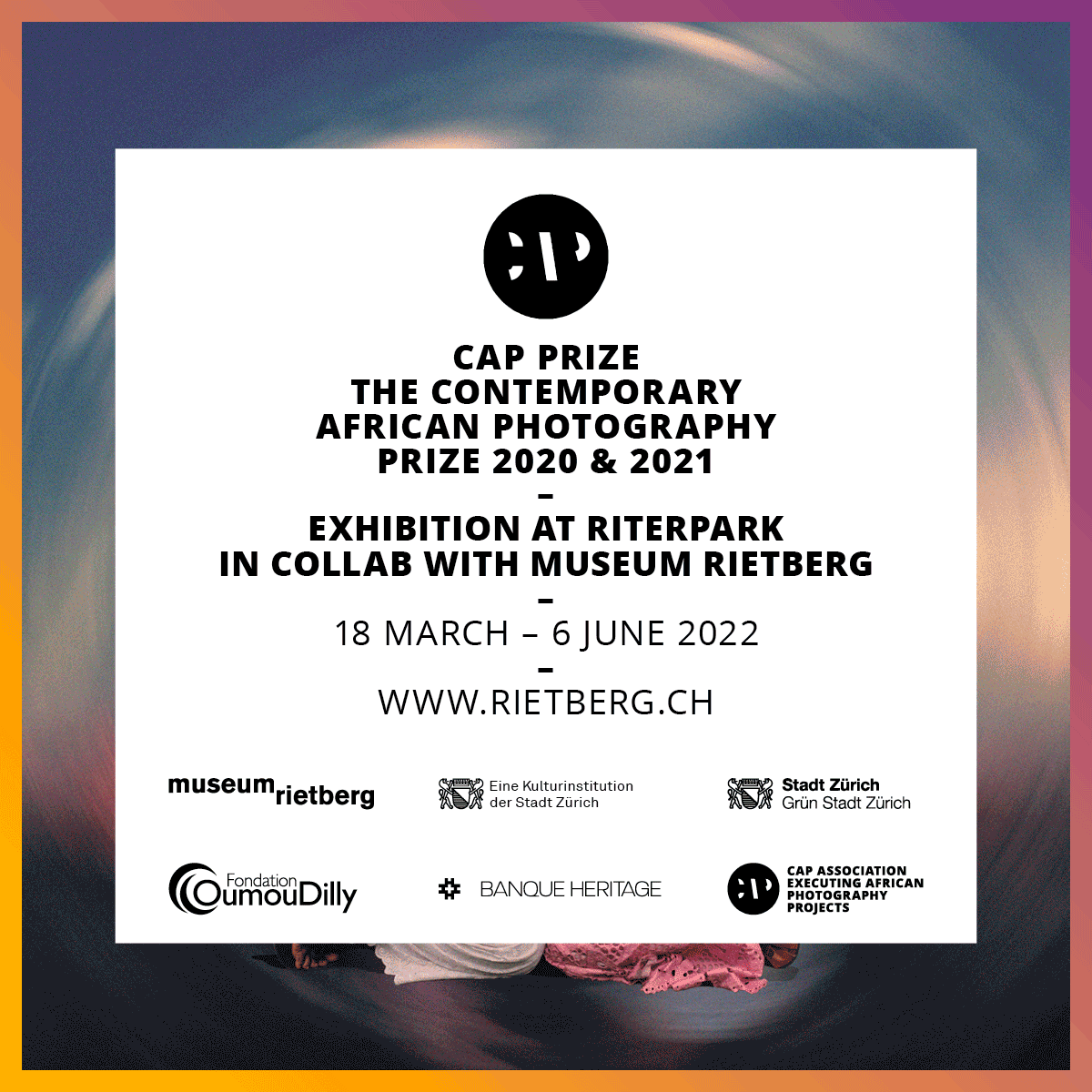CAP Prize 2022 | Shortlist
CAP PRIZE 2022 | SHORTLIST
These 25 shortlisted projects – in alphabetical order by artist– were chosen by a panel of 18 international judges. The shortlist comprises works by: Salih Basheer | Caimi & Piccinni | Tatenda Chidora | Colin Delfosse | Luke Dray | Nneka Iwunna Ezemezue | Stephan Gladieu | Pippa Hetherington | Amina Kadous | Heba Khalifa | Robert Nzaou Kissolo | Vuyo Mabheka | Remofiloe Nomandla Mayisela | Ayobami Ogungbe | Lee-Ann Olwage | Adetona Omokanye | Léonard Pongo | Mahefa Dimbiniaina Randrianarivelo | Dione Roach | Fatimazohra Serri | Ngadi Smart | Mekbib Tadesse | Pamela Tulizo | Charlotte Yonga
Salih Basheer
Born in 1995 in Khartoum, Sudan. Lives in Khartoum, Sudan
Website: www.salihbasheer.com | Instagram: @salihbashier
22 Days In Between, 2021
Found image of my mother. Date unknown
I have only a few memories of my parents, the first memory with my mother in our house yard. I'm horrified by the noise of aircraft flying in a low distance spraying repeller for mosquitoes and I'm trying to cover in her arms. The second memory is my father driving us in his white Fiat car to the Mosque for the Taraweeh prayer. It was Ramadan and I chose to go with my mother to the women's section on the second floor so I can enjoy looking down to the people while praying. The last memory I have is coming back from Kindergarten with my brother. I had my bag and was wearing a white shirt and there was a police car in front of our house door and there were many people inside the house yard crying. I don't remember whose death that day was mum or dad. These few engraved memories of my parents are all seen through the eyes of a child. I always question myself if these few memories are real or just dreams.
My parents passed away in 1998, I was three years old.
Ongoing project.
Jean-Marc Caimi & Valentina Piccinni
Jean-Marc Caimi , born in 1966 in Italy. Lives in Rome, Italy
Valentina Piccinni, born in 1982 in France. Lives in Italy
Website: www.caimipiccinni.com | Instagram: @caimipiccinni
AMAR, 2019
Untitled
Being a girl and playing rugby in an Islamic country is no easy task. Even in a place like Morocco, with its more modern approach to Islam, these sports are an exclusive of men. Coming from different social classes, the girls of the all-female AMAR rugby team face many obstacles, imposed by family and society, just to follow their sporting passion. They train in Zerktouni Stadium twice a week, combining fitness exercises and competitive matches. The club AMAR based in Marrakesh was founded in September 2015 by Aamr Elyazidi, a sport professor. The club participates in an annual Royal Moroccan Rugby Federation competition that starts in January and takes place throughout the country. Moreover every year it organises national and international rugby events as the Marrakesh Rugby Sevens Cup. Once or twice a year the club runs a demonstration match in traditional costumes. For these girls, rugby is a declaration of independence. There is more at stake in every match than winning against the opposing team; the real ultimate victory is claiming self-esteem, personal freedom and a primary role in Islamic society.
Tatenda Chidora
Born in 1988 in Harare, Zimbabwe. Lives in Pretoria, South Africa
Instagram: @tatendachidora
If Covid Was A Colour, 2022
Mask Conversation II
The work grew out of a period of lockdown: ‘I have never spent this much time in my apartment, life slowed down for everyone, but this was a good time to reflect.’ It is photography that evokes the moment beyond the catastrophe. Chidora turns surgical masks, latex gloves into props and costumes making them fashionable icons. This sits well with his philosophy, 'I find distortion quite beautiful in a way,' he says. 'I needed to start seeing daily moments through different eyes.' It is also a work of introspection. This is such a unique time to live, and we need a collection of images to look back upon beyond the tropes of dead bodies. With this series, Chidora forces us to ask: what does Covid look like?
‘If covid was a colour’ is an injunction. The layered materials and references used in most of the images create a portrait of black resistance. In the series, there is a mix of highly stylized and representational images juxtaposed with inventive explorations of belonging and vulnerability. If this is chaos, then Tatenda Chidora is a master of beautiful chaos. (Words by Dr Tinashe Mushakavanhu)
Colin Delfosse
Born in 1981 in Ixelles, Belgium. Lives in Brussels, Belgium
Website: www.colindelfosse.com| Instagram: @colindelfosse
fulu act, 2021
Junior Mungongu II
On Kinshasa’s streets, artists raise awareness about the challenges the Congolese capital city is facing. In an increasingly degraded environment, these artists question the profusion of consumption goods and rubbish, recycling them into costumes. Gathered in a collective, they perform in the street, condemning societal issues: lack of healthcare, pollution, deforestation and overconsumption. With an urban culture and ancestral symbolic rituals, the artists initiate a dialogue with the city’s inhabitants.
The demographic explosion of this megalopolis coupled with its inhabitants increasing needs, a global economy and significant appetite for single-use plastic have led to massive import of consumption goods, generating an environmental havoc. The consequences in numbers are alarming: 13 million inhabitants generate a volume of 7 tonnes of waste each day. Poor neighbourhoods are the most hardly stricken and inequalities reinforced.
Beyond the urban centre, the city is a succession of slums lacking any kind of infrastructure. Finding food and getting around are daily issues. The Congolese state is incapable of tackling basic challenges like roads, sewage and electricity.
In these areas, these artists re-embody their city by creating contemporary myths. As for traditional rituals, they personify the archetype of nature facing the main environmental challenges, questioning our modernity.
Luke Dray
Born in 1998 in Brighton, United Kingdom. Lives in Kampala, Uganda
Website: www.lukedray.com | Instagram: @lukedrayphoto | Twitter: @LukeDrayPhoto
People Power, A Ugandan Election, 2021
Bobi Wine, wearing his signature red beret banned by the Ugandan government, addresses the press at his recording studio November 26, 2019 in Kampala, Uganda. In September 2019, the government of Uganda banned the wearing of red berets, famously worn by Wine and the supporters of the People Power campaign. Despite this Wine and his supporters continue to defy this controversial law.
Repeatedly harassed, arrested, and beaten, pop star turned politician Robert Kyagulanyi Ssentamu (stage name Bobi Wine) gave hope to thousands of Ugandans as he ran in the 2021 presidential election taking on the incumbent of 35 years, President Yoweri Museveni. The opposition leader’s campaign was met by a brutal oppression by the state, which peaked when at least 54 people were killed during protests started after Wine was arrested before a rally in November 2020. Though Museveni was declared the winner of the election, Wine accuses the military of widespread ballot stuffing, and the international community has raised concerns about the election’s integrity.
A note: whilst many journalists tried to gain access to President Yoweri Museveni's 2020/2021 presidential campaign, they were blocked at every turn with only state media being allowed to attend.
Nneka Iwunna Ezemezue
Born in 1985 in Lagos, Nigeria. Lives in Lagos, Nigeria
Website: www.nnekaezemezue.com | Instagram: @nnekaezemezue | Twitter: @nnekaezemezue
There Will Be A Country, 2022
Renewable Energy
At independence, all eyes were on the most populous black country on earth and a key player in Africa’s future – Nigeria. Sixty years after independence, high levels of internal instability and corruption along with a political economy of violence compromise the country’s prospects and hope of a better future.
With the light of hope flickering, I am using this project ‘There will be a Country’ to create alternate narratives of a futuristic Nigeria. Utilising the layout of a fictitious news magazine titled ‘The Naija Times’ (Naija is a colloquial term for Nigeria), I construct narratives projecting what the Country’s future could behold. The intention is to foster a sense of hope for we Nigerians and catalyse new forms of activism thereby inciting positive change.
This project also aims to reframe the global mainstream medias' misconceptions, overgeneralizations and misrepresentations of Nigeria and by extension Africa - ‘the dark continent.’ Far too often, the African continent is portrayed through the prism of problems leaving out achievements and contributions to the international community. I see Africa as a continent of hope, promise and vast potential. I dream of a thriving Africa. The world has much to gain from it.
Stephan Gladieu
Born in 1969 in Paris, France. Lives in Paris, France
Website: www.stephangladieu.fr | Instagram: @stephangladieu
Homo Detritus, 2021
Untitled
From the mountains of rubbish that bury the slums of Kinshasa, an artistic and protest movement was born, which is part of the popular art approach. Dressed in masks and costumes made from rubbish, a generation of street kids and fine artists have come together in the collective «Ndaku, ya la vie est belle». Founded six years ago by the visual artist Eddy Ekete, the collective brings together nearly 25 artists who return to the traditional source of the African mask, while denouncing the ecological disaster they are suffering.
To reflect their struggle and their creativity, I decided to produce a series of totemic portraits, which combines documentary photography and artistic practice. Homo Détritus aims to highlight the work of these artists who militate locally against overconsumption and its environmental consequences; while questioning us about our collective responsibility and the solutions that could lead to a new, more sustainable and equitable balance. All these photographs were taken with the written consent of the collective and of each artist and done in total collaboration with them.
Pippa Hetherington
Born in 1971 in Kokstad, South Africa. Lives in Cape Town, South Africa
Website: www.pippahetherington.co.za | Instagram: @pippa_hetherington
Weaving the Archive, 2021
Lattice #7
This body of work looks at weaving the archive. Family albums and photography often depict something that isn’t the whole truth and often far removed from very important realities, and those realities become a dismembered version of a façade. Through making lattices with photographs from my own personal archive, experiences of growing up and living on this continent, I strive to embrace imperfection, to embrace my own imperfection. By using stitching in some of the images I mend the fractured but show the scars - unlike the family photos, which never show the wound or the scars. Latticing the images hold meaning in things that are part of each other but come from different threads. The process of weaving with photographic paper is a grounding action yet the paper holds fragility in it that needs to be handled carefully. Like memory.
Amina Kadous
Born in 1991 in El Mehalla, Egypt. Lives in Cairo, Egypt
Website: www.aminakadous.com | Instagram: @amina.kadous
White Gold, 2021
Untitled
The first seeds of my identity were planted in El Mehalla Al Kobra, home to me and Egyptian cotton. Through my young eyes, my grandfather’s house beamed with light and memories reflecting the cotton threads that extend three generations back. My great grandfather was a merchant of silk and wool, one of the first in El Mehalla to lead the initial stage of the popular manufacturing textile trade at the time. In the late 1960’s my grandfather established his textile factory in the city and my father joined him in the 1980’s, continuing to weave our family threads and plant the cotton seed.
I see myself reflected in the cotton’s journey. Drawing on the legacies of my grandparents, their archives, and my own country’s eroding history, I try, through this work,to reconnect and recollect what is left of our own withering seeds of cotton.What once was a major symbol for our Egyptian identity and our cultural wealth and that ties us all to our historical past.I explore the origin, evolution, erosion, and revival plans.Beneath the layers,unfolds the lineage of Egypt,from the past to its present we witness today. What could have been, what could still be, and what have we lost?
Amina Kadous
Born in 1991 in El Mehalla, Egypt. Lives in Cairo, Egypt
Website: www.aminakadous.com | Instagram: @amina.kadous
Subjects in the Mirror are closer
than they appear, 2022
Untitled
Floating fragments of myself.Between two layers.Blurry visions of faces and places that appear to be in my memory and my visions of my past.Home drawn in certain features and certain names and people of their time.Home that stays the same along with the people that keep lingering in the timelines of my past.Images and urban memoirs that embody the people and their memories. Reflected upon snippets of time and surfaces of the past.I search for familiarity and home through souls and through features of those who came and those who I extend from.
In an attempt to redraw and redefine and reflect on visions of my home,I use old and worn-out scratched mirror to try to reflect the past along through my present.The mirror works as a threshold.Building a metaphoric image of the situation I am experiencing, my own longing for home and my own vision of home comes as blurry as the features of its people.Searching through the only left behind testimonies of their time. Between a dual state. I try to recollect and collect what I remember within what’s forgotten. My visions of home are in a constant transformative state, they are constantly evolving and growing on me.
Heba Khalifa
Born in 1977 in Cairo, Egypt. Lives in Cairo, Egypt
Website: www.heba.photo
Ain el-Nimra Here and now, 2022
Shame
The artistic journey is a prickly,
electrocuting
Adventure.
I drown in trauma,
in shock and denial
in gentle limitless
expanse.
Here and now.
I ebb and flow without a shore.
I let go.
I embrace Ain el-Nimra.
I draw the line between what is documentary and what is personal? Three years ago, I decided to tackle familial violence through my very personal complex and darkly intimate mother-daughter relationship. It is an artistic adventure I embarked on as a woman, a mother, and a daughter inhabiting the Egyptian (post)-revolutionary context.
Ain el-Nimra : is a shameless, scary woman. This is what they called me.
In the name of tradition, religion, and politics, I was under daily attack by family and society that deprives my right to freely express myself, that frightens me from my body that will bring shame, the society that threatens me with harassment every day in the street, and the family that would cutting of me if I peel off the hijab,
Being a single mother where divorce is considered a taboo and a red line, makes me feel, rejected and exclusion
Ain el-Nimra supported by both Magnum Foundation and the Arab Fund for Arts and Culture (AFAC)
Robert Nzaou Kissolo
Born in 1976 in Nkayi, DR Congo. Lives in Pointe Noire, DR Congo
Website: www.robertnzaou.com | Instagram: @nzaourob
Louzolo, 2022
Louzolo
This photo series is called 'Louzolo', which means 'Love' in Kikongo, a local Congolese language.
The series explores the love languages in Congolese society, the do's and don'ts, what is acceptable and what's not... How much is too much, how can one express love in public. The images in this series portray a role reversal for what is usual in most Congolese households, showing men doing some of the things which are usually seen as a woman's domain, and demonstrating the joy that brings, to see a man doing even little things but which women appreciate very much.
Vuyo Mabheka
Born in 1999 in Libode, South Africa. Lives in Thokoza, South Africa
Instagram: @vuyo_mabheka
Popihuise, 2022
Cowboy
Popihuise is an ongoing project which explores childhood memories of growing up in an unstable home and the absence of a father figure at home.
As a kid I didn't have a place to call home, my family used to move around from place to place every once in a while. When my mother was at work during the day I was home doing chores and looking after my sibling after school, I barely had time to be around my peers. Making friends was hard because nobody knew who I am, at home I was too young to have an opinion and amongst my peers my opinion did not matter. I lost confidence in expressing myself in public, the only time I was part of the conversation was in my head when I'm alone at home.
Popihuise is an Afrikaans term for a dollhouse, something you can move around as you please and the characters only exist in your mind. I use photography and drawing because they are forms of archiving moments and emotions, I photograph people and draw a background to create imaginary scenes with the people of my community. Home is them, our relationships and memories amongst ourselves.
Remofiloe Nomandla Mayisela
Born in 1994 in Johannesburg, South Africa. Lives in Johannesburg, South Africa
Instagram: @mr.s___may
Lip Service, 2022
Serving Face
Lip Service emanates from exploring the notion behind the infamous phrase "The way to man's heart is through his stomach". A saying still so prevalent in a world where women are supposedly liberated.
Throughout the years, women have been assigned to spaces designated to them by a cultural system that promotes patriarchy. These spaces are often confined to a home and the most prominent space we are assigned to occupy is the kitchen.
Women continue to function as commodity fetish within well-established consumer culture, an experience not limited by nationality and geography. Comparing women to food is a very popular rhetorical device, and putting women on the same platform as food makes them look equal. Easy to get and enjoy.
The traditional outfit I wear is a blend of western and local South African household attire, propagating the female body as both colonial and cultural proprietary.
In an institutional union like marriage, as a young modern-day *makoti, based on my experience, I began questioning the strong cultural patriarchal assigning of women to kitchens and their bodies for consumption.
*A commonly used cultural term in South Africa, referring to a bride or daughter-in-law
Ayobami Ogungbe
Born in 1993 in Lagos, Nigeria. Lives in Lagos, Nigeria
Instagram: @ayobami.ogungbe
Point of Return, 2021
The Ocean Will Tell Us New Things
Point of Return is based on a historical passage point used for human trade from 15th to18th century Badagry which is my home town. Due to the export nature of this trade, and Badagry’s access to the Atlantic, a route was frequently plied and named due to the rise of this trade. It was named “point of no return”. With this series, I intend to show tentative reactions of humans that were traded during that time in juxtaposition with the current landscape of the route, presenting the former as repositories of experiences and bearers of distinctive identities.
Lee-Ann Olwage
Born in 1986 in Durban, South Africa. Lives in Cape Town, South Africa
Website: www.leeannolwage.com m| Instagram: @leeannolwage
Kakenya's Dream, 2022
Untitled
Worldwide, 129 million girls are out of school and only 49 percent of countries have achieved gender parity in primary education with the gap widening at secondary school level. Many girls are told from a young age what their lives will look like and are not given the opportunity to dream, learn and achieve their full potential.
What happens when a supportive environment is created where girls are given the opportunity to dream and thrive?
For this project, I worked with the girls from Kakenya's Dream, a nonprofit organization that leverages education to empower girls, end harmful traditional practices including female genital mutilation (FGM) and child marriage, and transform communities in rural Kenya. Their goal is to invest in girls from rural communities through educational, health, and leadership initiatives to create agents of change and to create a world where African women and girls are valued and respected as leaders and equal in every way.
Adetona Omokanye
Born in 1990 in Erin-Ile, Kwara State, Nigeria. Lives in Toronto, Canada
Website: www.adetonaomokanye.com | Instagram: @adetona_omokanye | Twitter: @AdetonaOmokanye
Recollection, 2021
Untitled
Culture and tradition are two major factors influencing the way people dress. Two different perspectives on Nigerian contemporary fashion reveal a complimentary visual in terms of cultural expression through the medium of style. Spiritually inspired clothing of masquerades represented by males and fashion-inspired contemporary clothing represented by female models are complimentary. By putting these different cultural ways of expression together to form digital art, this series aims to project how culture, community, and traditional heritage shape styles of fashion. It shows the synergy between two different cultural occasions and what links them together in terms of material, colours, and style. This reveals how culture, spiritual practices, and fashion are intertwined. With these pictures, I want to draw the attention of the observer to this closely intertwined relation and depict the inspiration of style through different perspectives. I use digital art to show the connection between a masquerade festival and a fashion show in terms of style by positioning them next to each other. My goal is to trace the evolution of styles and clothing on different cultural occasions to find out more about where the inspiration for colours and materials comes from.
Léonard Pongo
Born in 1988 in Liege, Belgium. Lives in Brussels, Belgium
Website: www.lpongo.com | Instagram: @leonardpongo
Primordial Earth, 2022
Untitled
Primordial Earth is a project shot in different parts of the DRC over the past years. It is a loose tale of creation/apocalypse and what’s in between. It offers a look at the country’s beautiful and diverse landscape and some of its traditions as the origins of consciousness and sources of inspiration for understanding, depicting and imagining our world.
Mahefa Dimbiniaina Randrianarivelo
Born in 1991 in Antananarivo, Madagascar. Lives in Antananarivo, Madagascar
Website: www.artofmatchbox.com | Instagram: @artofmatchboxd | Twitter: @xmatchboxdx
Sarotava, 2022
Isoraka, Antananarivo
Sarotava, which means mask in malagasy, is a series of images based on one concept: portraits of random people without heads. We often judge people by the way they look, even unconsciously. That is the main reason those strangers don’t have heads. But I want to talk about a specific group of people: the Malagasy people.
Madagascar, the only country who keeps on being impoverished for the past sixty years without war. How do you expect the proletarian to think about the current political situation when he lives on less than 1 dollar a day?
That’s what this series is about, it’s about how Malagasy people live. Here, you feel like you are in the middle-ages, yet, you have access to all the technology of the contemporary world. Your Maslow’s hierarchy of needs is all upside down.
All these people in this series share that story. It doesn’t matter if they’re catholic, muslim, straight, gay, they are the product of the history of this land. You don’t need to know them personally to know each and one of them are trying their hardest, hence the absence of heads. And the future of this country relies on these people.
Dione Roach
Born in 1989 in Poggibonsi, Italy. Lives in Douala, Cameroon
Website: www.dioneroach.com | Instagram: @dioneroach
Le Quatre Murs, 2021
Yakuza and Eto
This series is the result of a four year exploration and documentation of life inside the Central prison of Douala in Cameroon while I was working and directing a musical and audio-visual project within the structure. This is the most overcrowded prison of the country with over 5000 prisoners in a space that should host a fraction. There is no confinement inside the prison, and inmates are mostly left free to roam the grounds. It is a world within the world, with its own rules to which all inmates must submit. Far from any kind of sensationalising, the project seeks to portray with dignity and humanity the life and arts of some of the people that inhabit the prison and becomes a token of the time and trust that was shared along the way. It is also a feminine gaze on a world that is predominantly masculine, as well as an unique insight into an African prison, realities that are little talked about and hardly ever seen. Especially in a time where talk about prison reforms crosses the globe, I feel it is particularly relevant to give a voice and an image to those realities that go mostly unseen.
Fatimazohra Serri
Born in 1995 in Taza, Morocco. Lives in Nador, Morocco
Instagram: @fatimazohraserri | Twitter: @fatimazohraserri
Shades of Black, 2022
l‘origine du monde
This project was my artistic start in 2017, as my first project that is still ongoing, it was generated from a deep desire within me in order to express my thoughts and my denial of the situation in which I am and the women surrounding me.
I aim to depict through it the situation of women in the moroccan society and the conservative side in particular based on the realities of their livelihood, highlighting the various challenges they face.
I get inspired by my surroundings, women i know, the situations i face on a daily basis, sometimes something i heard from someone i know, all my photos are a reflection of the life of Women in my society are living, and me as well.
I also aspire in this project to expand on my explorations of femininity and womanhood in my pictures, and to highlight many topics related to women, femininity, sexuality, as well as the relationship between women and men.
Ngadi Smart
Born in 1988 in London, United Kingdom. Lives in London, United Kingdom
Website: www.ngadismart.com | Instagram: @ngadismart | Twitter: @NgadiSmart
“Wata Na Life”, 2021
Bay is an informal housing settlement on the coastline of central Freetown, the capital of Sierra Leone. In 2009, it had an estimated population of 10,989 people. Residents of Kroo Bay lack adequate access to sanitation and health services. Despite this, the community is thriving and the residents of Kroo Bay cherish the community that they consider as their home. Kadiatou Kamarra, 25, a resident of Kroo Bay for eight years, stands for a portrait by her home. The textures used for the collage come from the polluted sea water that surrounds the community which, during the rainy season, floods parts of Kroo Bay.
Wata Na Life (Krio for ‘Water is Life’), is a phrase I heard time and again in Sierra Leone, a country where water is very much a currency. Commissioned by Wateraid and British Journal of Photography, I spent three months in the country of my heritage exploring the link between water and our changing climate. What I found were communities adapting as best they could to the fall-out from a climate-exacerbated water crisis, amidst corruption and lack of governmental planning. The project is a marked rejection of the “dehumanising” way developing African nations have historically been portrayed by Western media — I counter tropes of “poverty porn” with vibrant collage; celebrating the essence and identities of the people and places of Sierra Leone, blending each location's scenery, portraits, and objects to form a more authentic representation than I felt any single photo could convey. I want Sierra Leoneans to look at this work and feel proud. That's the most important thing.
Mekbib Tadesse
Born in 1989 in Addis Ababa, Ethiopia. Lives in Addis Ababa, Ethiopia
Instagram: @Mekbib_Tadesse | Twitter: @TadesseMekbib
Lost in Connection, 2022
Reflected Refraction
The famous line from Mark Zuckerberg “A squirrel dying in front of your house may be more relevant to your interests right now than people dying in Africa.” Always makes me think about how Africans should be concise about their place in the virtual world. At its core the internet brings the world together and, in its coding, algorithms get to decide what we see to evoke emotions with commercial intent, seeking attention with a never-ending scroll, the same things created to make us connect are disconnecting us. It is evident that the general consumption of online content blinded by the joys of virtual experience, comes with a price be it chaos, disconnecting views, mental health, or at a price of country and men. As algorithms out us in a box we can’t escape. In this conversation, I mostly believe the African context has been on the sidelines. While Africa is trying to engage its population with wider internet penetration, many app developers have set aside the idea of the usage gap and underestimated the consumption of virtual content. Social media has not been the problem yet is being the engine for the chaos we currently feel.
Pamela Tulizo
Born in 1993 in Bulavu, DR Congo. Lives in Goma, DR Congo
Instagram: @pamelatulizo
Double identité, 2019
Untitled
By a game of looks, double identity aims to highlight the dual identity of Goma women. External ideas popularised by the press in particular, often show women victimised. On the other hand the images show more intimately how the women would like to be represented: As proud, beautiful women, strong and full of fight against social injustices. Starting from the urban reality of Goma and the everyday women of the Kivu province in North DR Congo, Pamela Tulizo staged their dual identity with the help of actors, mannequins, and dancers. This torn identity is anchored in more than 20 years of political instability in North Kivu, rooted in conflicts related to the high concentration of minerals buried in its soil and the fertility of its lands. Pamela Tulizo deplores the one-sided reporting by international press, NGOs, researchers, and artists. Tulizo claims that the constant negative reporting has an even more negative influence on the people, especially in Goma, resulting in a vicious circle and hindering the region from a positive development.
Charlotte Yonga
Born in 1985 in Paris, France. Lives in Barcelona, Spain
Website: www.charlotteyonga.com | Instagram: @charlotteyonga
Naam Na La, 2021
Assane et Nafina, Dakar, Sénégal
Last year I took part in a residency in Senegal whose theme was LOVE. I spent a month with this theme in mind, photographing without a pre-established plan, as I sometimes like to do. Back in Europe, as I was discovering my developed images, I received a message from one of my Dakaroi models, Assane, who wrote to me "Naam Na La". He translated the Wolof expression for me as 'I long for you'... I loved these words, which first of all reminded me how much love can exist in absence and that even though it is relative, complex and multiple, it remains one of the most universal feelings. These words had also echoed Love as it moves me, as I wished to interpret it almost unconsciously: fallible, nuanced, ambivalent. Despite the impossibility of defining its essence with exactitude, the photographic tool gives me the astonishing power to capture the subtle or manifest signs of Love, fictional or real, when it emanates from bodies, looks, gestures, even impregnates light, colour or places. I have composed this collection of images as an ode to tenderness, an affectionate reverence to Senegal and especially to those who embody it in my memory to this day.



